The god of small things - and a criticism of Bollywood
Publié le 17 Janvier 2008
Of Arundhati Roy’s very personal novel, no doubt much has been said. In the edition that I have, reviews have been put on the first pages, celebrating its magic, its mystery, its powerful rhythm, its innovative structure. Well, I must say I was slow at accepting all this as true [1]. But I couldn’t escape the vivid lavish texture. Story? I asked. But style, Sure. While I was reading the novel, I kept marvelling at some of the “tour de force” crafted by the young authoress (when I say young, it’s because the novel is her first, and so far only one). I relished in her language, an amazingly versatile tool under her pen, that is almost like a living organism, a glowing dough that she can knead into all the stupendous shapes you can (or can’t, in fact) imagine. For example she evokes (Virginia Woolf like) the goings-on in a twin’s childish (and sometimes not so childish) mind, and how it reacts to the grown-up rules, the adults’ reductionism of a world they have trapped for their own interests. For me that is the book’s great merit. The world that is created, with its assonances, its quirkiness, its sheer poetry, its humour, its flashes of beauty and its colourful, odourful, or tactile impressionism: wow, it leaves you breathless and gaping.
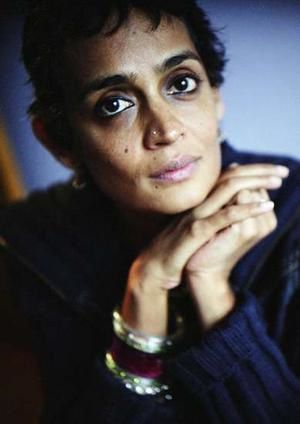 But in fact, it was almost too much. Style had taken over. I kept saying: okay, this lurid, weird, stunning style is something; but where is it taking me? Why do all the names sound the same? What is this story about? I had trouble balancing the versatility of the style effects and the contorted storyline, which sometimes looked like a boring digression. I told myself: patience, this is somebody’s first novel. And I persevered, and the end did bring together a good many of the strands. But until the end I believed the book was a strange creation, a monstrously beautiful monument of introspection and experimentation. It lacked in purpose what it displayed in creativity.
But in fact, it was almost too much. Style had taken over. I kept saying: okay, this lurid, weird, stunning style is something; but where is it taking me? Why do all the names sound the same? What is this story about? I had trouble balancing the versatility of the style effects and the contorted storyline, which sometimes looked like a boring digression. I told myself: patience, this is somebody’s first novel. And I persevered, and the end did bring together a good many of the strands. But until the end I believed the book was a strange creation, a monstrously beautiful monument of introspection and experimentation. It lacked in purpose what it displayed in creativity.
It’s only now that I have the whole picture in mind that I can assess its worth. It’s the ending that gives it its purpose. You need to sort of turn the volume around and look at it from the end. Now I can add to its smells, tastes and echoes the profound meaning that erupts at the end. The very physical presence of bodies, either loved or maimed, which fill the end of the story, their absolute price and unfathomable sensitivity, this is something which the skin can’t forget, which fills the imagination with a burn, or a weight one remembers intensely. And because the tragedy then becomes a social and political statement, as much as a poetic and intellectual one, the writer’s mission is justified. Thanks to her idiosyncratic language (and not in spite of it), she has said things which all of us can hear: the lush world of free childhood exists in all beings, and must be nourished and explored, and understood, by the educational institutions. The religious notion that all men are brothers, that we all have one loving Father who created us all equal, all filled with the infinite powers of love and responsibility, of compassion and dignity, of intelligence and self-respect, that no man is deprived of these, potentially, if society educates him towards this humanity: all systems which categorise men in a higher or a lower rank are an insult to that God’s power and gentleness.
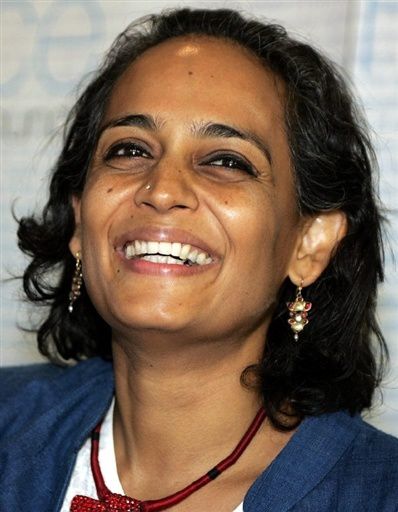 Decreeing human beings as “untouchable”, “impure”, “dirty”, and such like alienating notions, are nothing but man’s revenge on that gentle God. They are the evidence that man is limited (and sinful?), in spite of the divine seed within him. The God of small things demonstrates that without a well directed historical and social environment, the worst violence can monstrously maim and insult God’s creation. The book is an attempt at exploring the teeming proliferation of meaning and beauty, hidden in the human body and mind, along with a demonstration of the power of prejudice and deformity coming from limitation and alienation. Lack of understanding of God’s purpose in his Creation crushes bones and stamps nailed boots in defenceless groins. If we can’t see that the God who created the Universe is first the God who created the smelly and armless beggar, if we think that the God who engineered the marvels which physics and biology describe (or whose mystery is there “behind” and beyond them), doesn’t also love passionately the sneering aristocrat, we are creating our own God, a God of big things, of order, of hierarchy, a moral God that rewards and punishes.
Decreeing human beings as “untouchable”, “impure”, “dirty”, and such like alienating notions, are nothing but man’s revenge on that gentle God. They are the evidence that man is limited (and sinful?), in spite of the divine seed within him. The God of small things demonstrates that without a well directed historical and social environment, the worst violence can monstrously maim and insult God’s creation. The book is an attempt at exploring the teeming proliferation of meaning and beauty, hidden in the human body and mind, along with a demonstration of the power of prejudice and deformity coming from limitation and alienation. Lack of understanding of God’s purpose in his Creation crushes bones and stamps nailed boots in defenceless groins. If we can’t see that the God who created the Universe is first the God who created the smelly and armless beggar, if we think that the God who engineered the marvels which physics and biology describe (or whose mystery is there “behind” and beyond them), doesn’t also love passionately the sneering aristocrat, we are creating our own God, a God of big things, of order, of hierarchy, a moral God that rewards and punishes.
Childhood is the time of life when we are yet open to this Creation, struck by its novelty, its wonder, its crispness. And it’s normal to lose some of that impact: one becomes accustomed to its splendour and its revelation. One tends to forget that what is there in front of us is a show of the Creator’s great Act. There is a moment in the book when policemen are arriving to the river house where the entire story converges, and one of them for a moment sees the workings of Creation: a dragonfly poised on a leaf, and he starts wondering at its beautiful reality. But the flap soon falls, and the view is obliterated. Pressed by duty, he resumes his policemen’s thoughts. What follows next is a scene whose horror I have rarely met in literature, not because it says things that are new in any way, but it’s how they are said. We are no longer in the flow of consciousness, or rather, the contrast with the novel’s general tone and that passage is so brutal and harsh – we know it’s going to happen, too – that it creates all the “literary” pain you can possibly feel concerning one individual. Luckily for us, in a flashback, the novel ends on a love scene whose intention might well be to soothe the reader's pulse. I don’t know if it’s that scene that won Roy ten years of harassment in the form of a lawsuit for obscenity charges, but that’s just it: the novel contains that weight of experience which is probably too hard for some to swallow.
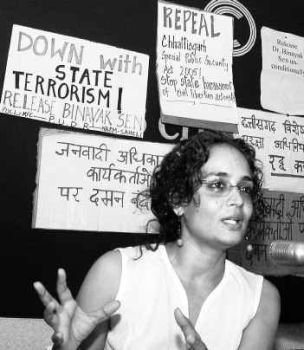 Not surprisingly, Arundhati Roy is well known for her activism, and for those who are interested (and it has a rather important bearing on the understanding of her novel, the only one so far, which in part is autobiographic, I discovered), the same Wiki link gives a good description of that passionate if sometimes naïve commitment, says the author. Well, it’s not always naïve. In this Guardian article, she speaks of her commitment, and to me it has the ring of true concern:
Not surprisingly, Arundhati Roy is well known for her activism, and for those who are interested (and it has a rather important bearing on the understanding of her novel, the only one so far, which in part is autobiographic, I discovered), the same Wiki link gives a good description of that passionate if sometimes naïve commitment, says the author. Well, it’s not always naïve. In this Guardian article, she speaks of her commitment, and to me it has the ring of true concern:
“Unlike other Indian-born writers who have relocated to the US and Europe, Roy is determined to remain a thorn in the side of the establishment in India. "Here you see what's happening. People are driven out of villages, driven out of the cities, there's a kind of insanity in the air and all of it held down by our mesmeric, pelvic-thrusting Bollywood movies. The Indian middle class has just embarked on this orgy of consumerism."
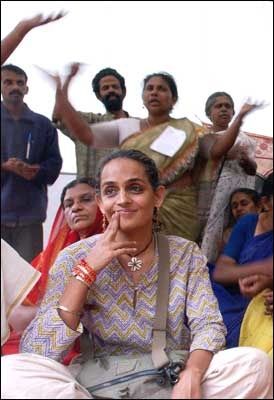 What she says about that “mesmeric, pelvis-thrusting Bollywood movies”, I have often described in this blog (even if I admit that at first I didn’t see that aspect). A lot of the films which many enthusiastic spectators write off as great entertainment are guilty of alienating the poorer classes into believing that whatever they do, things will not change. The masses watch these films, dream about those heroes, and forget what makes their dreams so necessary: a drab life which they are made to accept by that way. The fact that so many of the films are violence and sex-filled is obvious: only a few escape that temptation. But what this characteristic means is that it transforms the public into addicts, it takes away their better judgement, and feeds them with heroes and heroines instead of educating them.
What she says about that “mesmeric, pelvis-thrusting Bollywood movies”, I have often described in this blog (even if I admit that at first I didn’t see that aspect). A lot of the films which many enthusiastic spectators write off as great entertainment are guilty of alienating the poorer classes into believing that whatever they do, things will not change. The masses watch these films, dream about those heroes, and forget what makes their dreams so necessary: a drab life which they are made to accept by that way. The fact that so many of the films are violence and sex-filled is obvious: only a few escape that temptation. But what this characteristic means is that it transforms the public into addicts, it takes away their better judgement, and feeds them with heroes and heroines instead of educating them.
Upon reading Roy’s sobering comments on the inefficiency of certain types of activism, which according to her will be be able to change the age-old practices of corruption, torture, and political self-interests, one wonders: can literature do something that activism is powerless to do? Could the God of small things be more powerful than the other one?
“Roy says she had given ideological opponents a handy hate figure. "In India I'm portrayed more as a hysterical, lying, anti-national harridan.
"In this adversarial game that goes on, you can get pinned down to spewing facts and numbers, but those are not the only truths ... I've done that. I've fought that battle," she says. "But the distillation of those things into literature is a different kind of intervention." (same article)
PS: I don’t think it’d be very easy to make a film out of The god of small things; so much of it really happens inside the characters’ minds. Nevertheless, as I was reading it, I tried to put faces on some of the names: Chacko could be Jackie Shroff, Ammu would be easily played by an actress like Tabu (in fact, Arundhati Roy herself has the lovely physique that corresponds); for the twins, I don’t know; and Velutha, well he would certainly find a bright aspiring actor from the South! Any ideas?
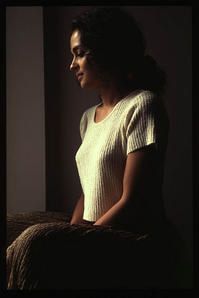
[1] The mixed reviews that the book received is for me a sign that my intuition is not entirely unfounded see this wiki link, where the critic “Carmen Callil, chair of the Booker judges panel in 1996, called The God of Small Things "an execrable book" and said it should never have reached the shortlist.”
/image%2F1489169%2F20200220%2Fob_9722d6_banner-11.JPG)